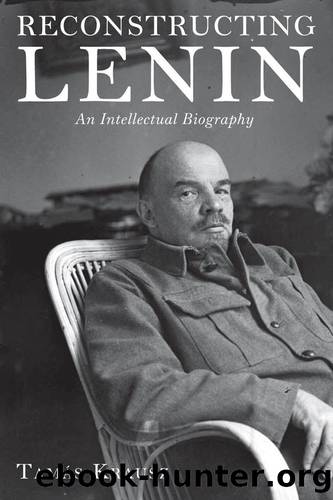Reconstructing Lenin: An Intellectual Biography by Krausz Tamás

Author:Krausz, Tamás [Krausz, Tamás]
Language: eng
Format: epub
Publisher: Monthly Review Press
Published: 2015-02-27T08:00:00+00:00
When an English workers’ delegation visited me 26 May 1920, and I told them that every decent English worker should desire the defeat of the English government, they understood nothing. They made faces that I think even the best photograph could not capture. They simply could not get into their heads the truth that in the interests of world revolution, workers must wish the defeat of their government.51
Typically, Lenin did not perceive that an understanding of his thesis—“the defeat of one’s own government”—does not depend solely on the presence of subjective-intellectual conditions, but that the very existential conditions of revolutionary self-consciousness were lacking in England, in the sense in which he himself approached it theoretically. In England, as in most Western bourgeois systems, the conflict between the working class and capital evolved quite differently from the way it did in Russia. And not only were a chain of completely different mediations at question here, but also a mentality leaning more toward compromise, which their history had forged. Lenin had acquainted himself with it in the years of his emigration, even trying to describe the phenomenon along with its causes, but without developing a deeper empathy or affinity for it. What he certainly was aware of was that the “development of the revolution” is “more complex,” and “runs on divergent tracks.” The real intricacy of the problem was shown by the fact that he himself criticized leftism, on the grounds that it does not take account of the regional and national specificities of development. Finally, all of these questions are not simple at the dawn of a new age, as even historians are sometimes prone to admit. Lenin had been critical of the left communists at the time of the Brest-Litovsk Treaty, and it was precisely during the year 1920 that he dedicated his most lively consideration to the problem of “Left-Wing Communism: An Infantile Disorder.” But at the time perhaps he himself did not realize in its complete actuality the historical significance of the chasm separating “the theoretical consciousness and the practical consciousness of the proletariat.” Thus Lenin did not draw far-reaching conclusions from his experience with the workers’ delegation from England, and he certainly did not apply it to the Polish situation, though it was clear from the autumn of 1920 onward that nationalism proved stronger than socialism throughout all of Europe, even if the forms this nationalism took differed.
In a spirit of self-criticism and disappointment at the party conference, Lenin questioned his earlier conviction that “in Poland the proletarian population is well matured and the rural proletariat is better educated which tells us: you must help them sovietize.” A number of times he cited with emphasis, “a great national surge of petit-bourgeois elements who, as we got closer to Warsaw, were terrified for their national existence” as the cause of the “enormous defeat.” Lenin stressed that the regions with the industrial proletariat started even farther away than Warsaw, which they did not come close to occupying,52 and thus could not secure any palpable experience of their readiness for revolution.
Download
This site does not store any files on its server. We only index and link to content provided by other sites. Please contact the content providers to delete copyright contents if any and email us, we'll remove relevant links or contents immediately.
| Africa | Americas |
| Arctic & Antarctica | Asia |
| Australia & Oceania | Europe |
| Middle East | Russia |
| United States | World |
| Ancient Civilizations | Military |
| Historical Study & Educational Resources |
Rasputin by Joseph T. Fuhrmann(560)
Russian Revolution: A Concise History From Beginning to End (October Revolution, Russian Civil War, Nicholas II, Bolshevik, 1917. Lenin) (One Hour History Revolution Book 3) by Hourly History(334)
The Russian Revolution: A Very Short Introduction (Very Short Introductions) by S. A. Smith(332)
FROM RUSSIA, WITH LOVE by Ian Fleming(323)
Moscow Monumental by Katherine Zubovich(320)
The Russian Five by Keith Gave(310)
Reconstructing Lenin: An Intellectual Biography by Krausz Tamás(302)
Authoritarian Nightmare by John W. Dean & Bob Altemeyer(299)
Winter is Coming by Gary Kasparov(297)
Kremlin Rising by Peter Baker(273)
Io dirò la verità by Germano Maifreda(258)
Spetsnaz: The Inside Story of the Soviet Special Forces by Viktor Suvorov(243)
Russia Resurrected by Kathryn E. Stoner;(234)
My Further Disillusionment in Russia by Emma Goldman(233)
Voices From Stalingrad by Bastable Jonathan;(227)
13 KGB by Unknown(217)
The Russian Revolution in Ukraine (March 1917 â April 1918) by Nestor Makhno & Nestor Makhno(212)
Jihad and Death by Roy Olivier;(200)
Russian Revolution, 1917 (9781108109161) by Wade Rex A(187)
